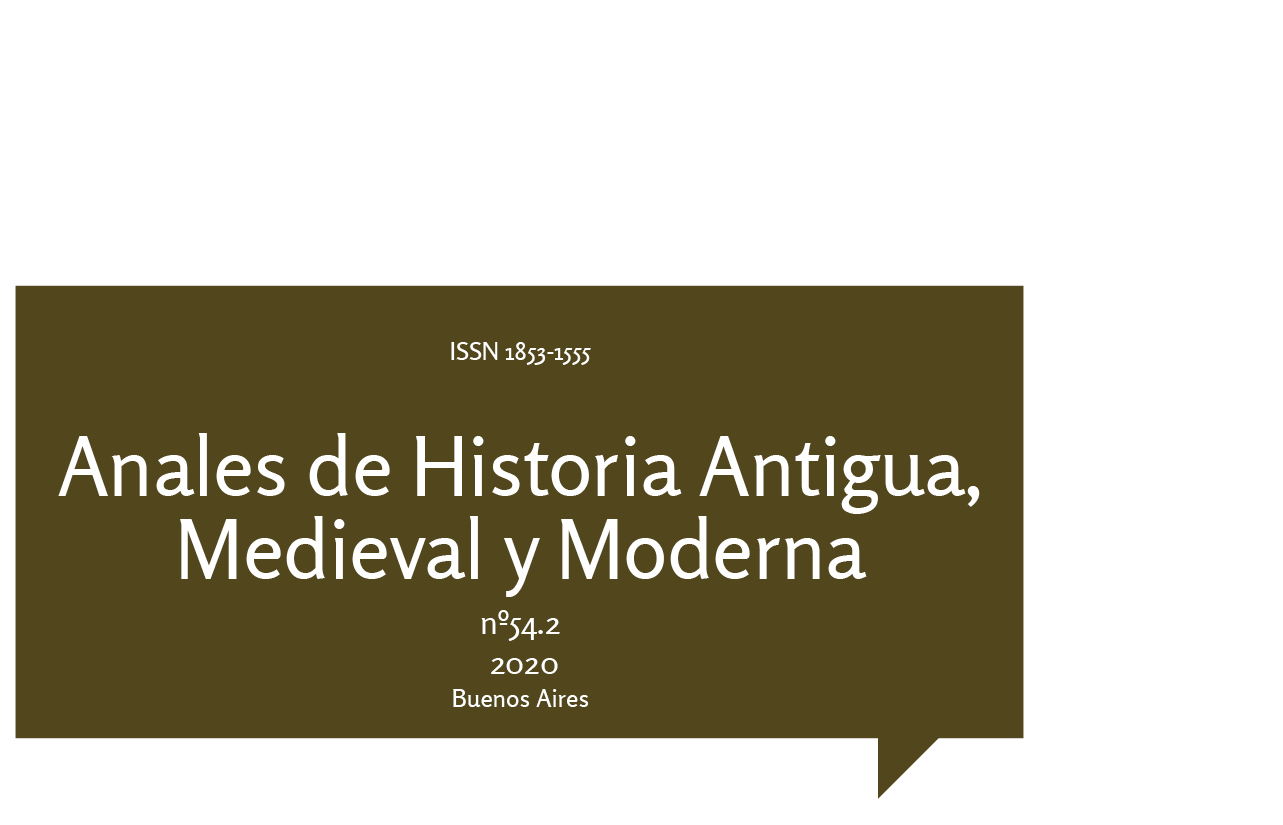Advantages of Histoire Croisée for the study of Spartan History in the Classical Period
Abstract
The political relationship between the Greek poleis were comprehensible because of the Mediterranean Sea, a relational space of a limited dimension. Bearing in mind this situation, our aim is to analyse the political relationship carried out by the spartiate navarch Lysander in Greece during the Classical period through the theoretical framework of the French Discourse Analysis and Network Theory, and the comparative perspective offered by the Histoire Croisée. We propose that a research on multiple temporalities and specialities will help to overcome the Athenocentric historiographical trend that considers Lysander and king Agesilaos II as the solely responsible for the disruption of their society.Downloads
References
Assumpção, L. F. B. de. (2019). A representação da mḗtis do esparciata Lisandro na Batalha de Egospótamo (405 a.C.). Romanitas. Revista de Estudos Grecolatinos, 13, 127-142.
Beck, H. (2008). Prologue. En J. Buckler y H. Beck (Eds.), Central Greece and the Politics of Power in the Fourth Century B.C. (1-30). Cambridge: Cambridge University Press.
Beck, H. y Funke, P. (2015). An introduction to federalism in Greek antiquity. En H. Beck y P. Funke (Eds.), Federalism in Greek Antiquity (1-29). Cambridge: Cambridge University Press.
Buckler, J. (2003). Aegean Greece in the Fourth Century B.C. Leiden: Brill.
Canfora, L. (2016). Tucidide: la menzogna, la colpa, l’esilio. Bari: Editori Laterza.
Cartledge, P. (1987). Agesilaos and the Crisis of Sparta. Baltimore: The Johns Hopkins University Press.
Cartledge, P. (2003). The Spartans: An Epic History. Londres: Pan Books.
Christien, J. y Ruzé, F. (2007). Sparte: Géographie, mythes et histoire. Paris: Armand Colin.
David, E. (1981). Sparta between Empire and Revolution (404-243 B.C.): Internal Problems and Their Impact on Contemporary Greek Consciousness. Nova Iorque: Arno Press.
De Certeau, M. (2008). A Escrita da História. Rio de Janeiro: Forense-Universitária.
DeVoto, J. (1982). Agesilaos II and the Politics of Sparta, 404-377 B.C. Chicago: Loyola University of Chicago (Tese).
Finley, M. (1981). Economy and Society in Ancient Greece. Nova Iorque: The Viking Press.
Fornis, C. (2016). Esparta: La historia, el cosmos y la leyenda de los antiguos espartanos. Sevilla: Editorial Universidad de Sevilla.
Fornis, C. (2018). El poco espartano patronazgo de Agesilao. En J. Pascual, B. Antela-Bernárdez y D. Castro (Eds.), Cambio y pervivencia. El mundo griego en el siglo IV a.C. (125-139). Madrid: Ediciones Universidad Autónoma de Madrid.
Funke, P. (2009). Between Mantinea and Leuctra. En P. Fnke y N. Luraghi (Eds.), The Politics of Ethnicity and the Crisis of the Peloponnesian League (1-14), Cambridge: Harvard University Press.
Hamilton, C. (1979). Sparta’s Bitter Victories: Politics and Diplomacy in the Corinthian War. Ithaca: Cornell University Press.
Hamilton, C. (1991). Agesilaus and the Failure of Spartan Hegemony. Ithaca: Cornell University Press.
Hanson, V.D. (2012). Uma Guerra sem igual: como atenienses e espartanos lutaram na Guerra do Peloponeso. Rio de Janeiro: Record.
Herman, G. (1987). Ritualised Friendship and the Greek City. Cambridge: Cambridge University Press.
Hodkinson, S. (2000). Property and Wealth in Classical Sparta. Swansea: The Classical Press of Wales.
Kadushin, C. (2012). Understanding Social Networks: theories, concepts, and findings. Oxford: Oxford University Press.
Kagan, D. (1969). The Outbreak of the Peloponnesian War. Ithaca: Cornell University Press.
Kagan, D. (1974). The Archidamian War. Ithaca: Cornell University Press.
Kagan, D. (1981). The Peace of Nicias and The Sicilian Expedition. Ithaca: Cornell University Press.
Kagan, D. (1987). The Fall of the Athenian Empire. Ithaca: Cornell University Press.
Konstan, D. (2005). A amizade no mundo clássico. São Paulo: Odysseus Editora.
Lemercier, C. (2015). Formal Network Methods in History: Why and How?. En G. Fertig (Ed.), Social Networks, Political Institutions, and Rural Societies (281-310). Turnhout: Brepols.
Low, P. (2007). Interstate Relations in Classical Greece: Morality and Power. Cambridge: Cambridge University Press.
Maingueneau, D. (1997). Novas Tendências em Análise do Discurso. Campinas: Editora da UNICAMP.
Malkin, I. (2011). A Small Greek World: Networks in the Ancient Mediterranean. Oxford: Oxford University Press.
Mossé, C. (1968). Les institutions politiques grecques à l’époque Classique. Paris: Armand Colin.
Pires, F. M. (2006). Mithistória (Vol. II). São Paulo: Humanitas.
Powell, A. (2001). Athens and Sparta: Constructing Greek Political and Social History, from 478 BC. Londres: Routledge.
Powell, A. (2010). Divination, Royalty and Insecurity, En A. Powell y S. Hodkinson (Eds.), Sparta: The Body Politic (85-136). Swansea: The Classical Press of Wales.
Raaflaub, K. (2006). Thucydides on Democracy and Oligarchy. En A. Rengakos y A. Tsakmakis (Eds.), Brill’s Companion to Thucydides (189-223). Leiden: Brill.
Rusch, S. M. (2011). Sparta at War: Strategy, Tactics, and Campaigns, 550-362 BC. Londres: Frontline Books.
Starr. C. G. (1965). The Credibility of Early Spartan History. Historia, 14, 257-272.
Ste. Croix, G. E. M. (1972). Spartan Foreign Policy, and the Peloponnesian League. En G. E. M. Ste. Croix (Ed.), The Origins of the Peloponnesian War (89-166). Londres: Duckworth.
Taylor, M. (2010). Thucydides, Pericles, and the Idea of Athens in the Peloponnesian War. Cambridge: Cambridge University Press.
Tritle, L. (1997). Introduction. En L. Tritle (Ed.), The Greek World in the Fourth Century: From the Fall of the Athenian Empire to the Successors of Alexander (1-7). Londres: Routledge.
Vlassopoulos, K. (2009). Beyond and Below the Polis: Networks, Associations, and the Writing of Greek History. En L. Malkin, C. Constantakopolou y K. Panagopoulou (Eds.), Greek and Roman Networks in the Mediterranean (12-23). Londres: Routledge.
Werner, M. y Zimmermann, B. (2003). Pensar a história cruzada: entre empiria e reflexividade. Textos de História, 11(1/2), 89-127.
Westlake, H. D. (1971). Thucydides and the Uneasy Peace. A Study in Political Incompetence. The Classical Quarterly, 21(2), 315-325.
Copyright (c) 2020 Anales de Historia Antigua, Medieval y Moderna

This work is licensed under a Creative Commons Attribution-ShareAlike 4.0 International License.








